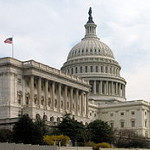DOJ Settles With JPMorgan Chase Over Bankruptcy Practices
 The Department of Justice’s U.S. Trustee Program (USTP) has entered into a national settlement agreement with JPMorgan Chase Bank N.A. (Chase) requiring Chase to pay more than $50 million, including cash payments, mortgage loan credits and loan forgiveness, to over 25,000 homeowners who are or were in bankruptcy. Chase will also change internal operations and submit to oversight by an independent compliance reviewer. The proposed settlement has been filed in the U.S. Bankruptcy Court for the Eastern District of Michigan, where it is subject to court approval.
The Department of Justice’s U.S. Trustee Program (USTP) has entered into a national settlement agreement with JPMorgan Chase Bank N.A. (Chase) requiring Chase to pay more than $50 million, including cash payments, mortgage loan credits and loan forgiveness, to over 25,000 homeowners who are or were in bankruptcy. Chase will also change internal operations and submit to oversight by an independent compliance reviewer. The proposed settlement has been filed in the U.S. Bankruptcy Court for the Eastern District of Michigan, where it is subject to court approval.
In the proposed settlement, Chase acknowledges that it filed in bankruptcy courts around the country more than 50,000 payment change notices that were improperly signed, under penalty of perjury, by persons who had not reviewed the accuracy of the notices. More than 25,000 notices were signed in the names of former employees or of employees who had nothing to do with reviewing the accuracy of the filings. The rest of the notices were signed by individuals employed by a third party vendor on matters unrelated to checking the accuracy of the filings.
Chase also acknowledges that it failed to file timely, accurate notices of mortgage payment changes and failed to provide timely, accurate escrow statements.
“It is shocking that the conduct admitted to by Chase in this settlement, including the filing of tens of thousands of documents in court that never had been reviewed by the people who attested to their accuracy, continued as long as it did,” said Acting Associate Attorney General Stuart F. Delery. “Such unlawful and abusive banking practices can deprive American homeowners of a fair chance in the bankruptcy system, and we will not tolerate them.”
“This settlement should signal once again to banks and mortgage servicers that they cannot continue to flout legal requirements, compromise the integrity of the bankruptcy system and abuse their customers in financial distress,” said Director Cliff White of the U.S. Trustee Program. “It should be acknowledged that Chase responded to the U.S. Trustee’s court actions by conducting an internal investigation and taking steps to mitigate harm to homeowners. But years after uncovering improper mortgage servicing practices and entering into court-ordered settlements to fix flawed systems, it is deeply disturbing that a major bank would still make improper court filings and fail to provide adequate and timely notices to homeowners about payments due. Other servicers should take note that the U.S. Trustee Program will continue to police their practices and will work to ensure that those who do not comply with bankruptcy law protections for homeowners will pay a price, just as Chase has done in this matter.”
Payments, Credits and Contributions of More Than $50 Million:
In the proposed settlement, Chase agrees to provide payments, credits and contributions totaling more than $50 million:
- Chase will provide $22.4 million in credits and second lien forgiveness to about 400 homeowners who received inaccurate payment increase notices during their bankruptcy cases.
- Chase will pay $10.8 million to more than 12,000 homeowners in bankruptcy through credits or refunds for payment increases or decreases that were not timely filed in bankruptcy court and noticed to the homeowners.
- Chase will pay $4.8 million to more than 18,000 homeowners who did not receive accurate and timely escrow statements. This includes credits for taxes and insurance owed by the homeowners and paid by Chase during periods covered by escrow statements that were not timely filed and transmitted to homeowners.
- Chase will pay $4.9 million, through payment of approximately $600 per loan, to more than 8,000 homeowners whose escrow payments Chase may have applied in a manner inconsistent with escrow statements it provided to the homeowners.
- Chase will contribute $7.5 million to the American Bankruptcy Institute’s endowment for financial education and support for the Credit Abuse Resistance Education Program.
Changes to Internal Operations: In the proposed settlement Chase also agrees to make necessary changes to its technology, policies, procedures, internal controls and other oversight systems to ensure that the problems identified in the settlement do not recur.
Oversight by Independent Reviewer: Amy Walsh, a partner with the law firm Morvillo LLP, has been selected to serve as independent reviewer to verify that Chase complies with the settlement order. The independent reviewer will file public reports with the bankruptcy court.
No Effect on Additional Relief by Homeowners: This settlement does not affect the rights of any homeowners to seek any relief against Chase that they may deem appropriate.
Chase Contact Information: Homeowners with questions about the settlement may contact Chase at 866-451-2327.
The settlement is the culmination of actions taken by the U.S. Trustee Program in districts around the country concerning Chase’s improper practices in bankruptcy cases, including robo-signing. Director White commended the U.S. Trustee Program team in the field and headquarters who expertly identified, investigated, litigated and settled this matter, including Deputy Director and General Counsel Ramona Elliott, National Creditor Enforcement Coordinator Gail Geiger and Trial Attorneys Diarmuid Gorham and Kelley Callard.
The U.S. Trustee Program is the component of the Justice Department that protects the integrity of the bankruptcy system by overseeing case administration and litigating to enforce the bankruptcy laws. The U.S. Trustee Program has 21 regions and 93 field office locations.
 The U.S. Senate has confirmed former Google executive Michelle Lee to head the U.S. Patent and Trademark Office, a position that has been vacant for more than two years, reports Reuters.
The U.S. Senate has confirmed former Google executive Michelle Lee to head the U.S. Patent and Trademark Office, a position that has been vacant for more than two years, reports Reuters. A white paper written by Howard Mavity of Fisher & Phillips give some advice on what managers need to note in order to challenge OSHA citations, especially when the citations arrive months after an inspection.
A white paper written by Howard Mavity of Fisher & Phillips give some advice on what managers need to note in order to challenge OSHA citations, especially when the citations arrive months after an inspection.
 An analysis by June DeHart, published in Environmental Leader, discusses the prospects of Congress lifting the ban on crude oil exports.
An analysis by June DeHart, published in Environmental Leader, discusses the prospects of Congress lifting the ban on crude oil exports. The new Republican majority in the Senate is turning up the pressure on the National Labor Relations Board, with a series of hearings and legislative attacks against policies that make it easier for workers to unionize, reports The Hill.
The new Republican majority in the Senate is turning up the pressure on the National Labor Relations Board, with a series of hearings and legislative attacks against policies that make it easier for workers to unionize, reports The Hill. The Network for Public Health Law has posted a complimentary webinar that looks at the structure and essential functions of the state and federal court systems, including administrative courts; explores the Tribal court system; and examines the role of court watch programs in addressing public health issues.
The Network for Public Health Law has posted a complimentary webinar that looks at the structure and essential functions of the state and federal court systems, including administrative courts; explores the Tribal court system; and examines the role of court watch programs in addressing public health issues. Microsoft’s general counsel says he wants 2015 to be a “year for solutions” when it comes to the intersection of the internet and international law, according to a report at GeekWire.com.
Microsoft’s general counsel says he wants 2015 to be a “year for solutions” when it comes to the intersection of the internet and international law, according to a report at GeekWire.com. Business Insurance offers a free on-demand webinar explaining how and why companies should prepare to comply with fresh health benefits requirements under the Patient Protection and Affordable Care Act and the political, legal and regulatory changes that could alter the continued implementation of the five-year-old landmark law.
Business Insurance offers a free on-demand webinar explaining how and why companies should prepare to comply with fresh health benefits requirements under the Patient Protection and Affordable Care Act and the political, legal and regulatory changes that could alter the continued implementation of the five-year-old landmark law. Performance-based contracting received a boost this month when the Government Accountability Office found that the U.S. Department of Transportation is making progress in moving toward a national performance-based approach, reports Forbes.
Performance-based contracting received a boost this month when the Government Accountability Office found that the U.S. Department of Transportation is making progress in moving toward a national performance-based approach, reports Forbes. Ropes & Gray has published an examination of a recent 4th U.S. Circuit Court of Appeals ruling on the False Claims Act (FCA) in United States ex rel. Badr v. Triple Canopy, Inc., No. 13-2101.
Ropes & Gray has published an examination of a recent 4th U.S. Circuit Court of Appeals ruling on the False Claims Act (FCA) in United States ex rel. Badr v. Triple Canopy, Inc., No. 13-2101. Equifax Workforce Solutions will present a free webinar discussing best practices for incorporating electronic records throughout the life of a mortgage loan, as well as the power of electronic signatures as a tool for achieving compliance with the ever-increasing regulatory burden.
Equifax Workforce Solutions will present a free webinar discussing best practices for incorporating electronic records throughout the life of a mortgage loan, as well as the power of electronic signatures as a tool for achieving compliance with the ever-increasing regulatory burden. GovWin has published a free white paper on the top government contract set-asides for the current fiscal year.
GovWin has published a free white paper on the top government contract set-asides for the current fiscal year. Piliero Mazza has posted a free white paper analyzing the Small Business Administration’s proposed rule to implement provisions of the National Defense Authorization Act of 2013 (NDAA) that change the way firms calculate compliance with the limitation on subcontracting rule on small business set-asides.
Piliero Mazza has posted a free white paper analyzing the Small Business Administration’s proposed rule to implement provisions of the National Defense Authorization Act of 2013 (NDAA) that change the way firms calculate compliance with the limitation on subcontracting rule on small business set-asides. Crowell & Moring has posted the slides from a recent webinar on the recent ASBCA decision in
Crowell & Moring has posted the slides from a recent webinar on the recent ASBCA decision in  The Supreme Court could put the brakes on the Obama administration’s growing crackdown against companies facing claims of discrimination against women, minorities and other protected groups, the Associated Press reports.
The Supreme Court could put the brakes on the Obama administration’s growing crackdown against companies facing claims of discrimination against women, minorities and other protected groups, the Associated Press reports.